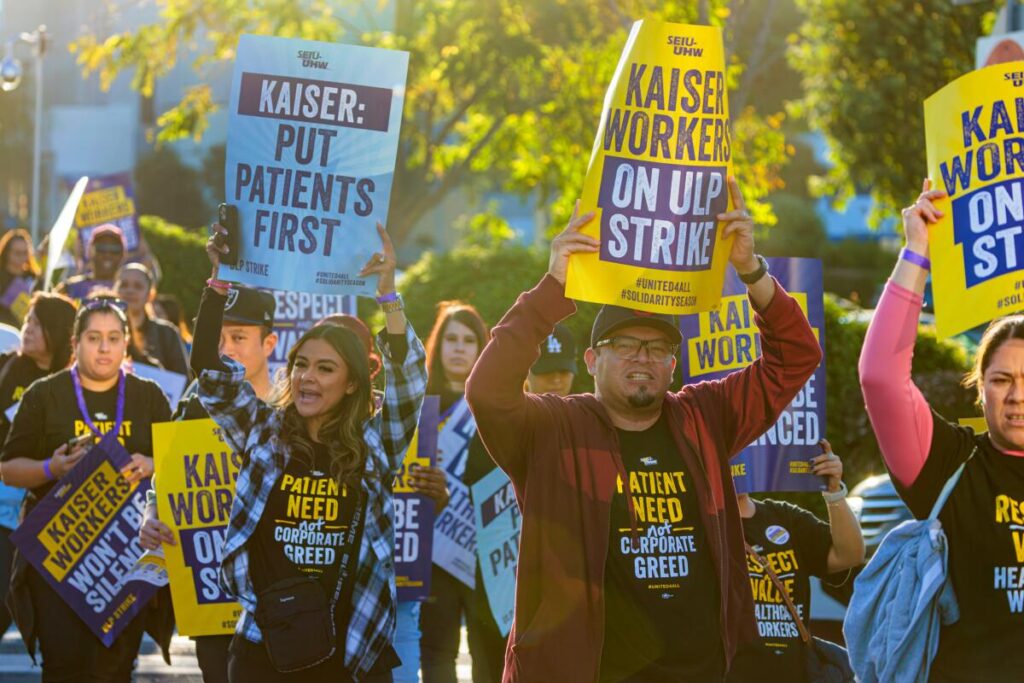Kaiser Permanente Strike

Another big piece of recent labor news is that the largest health care strike in the history of the United States just went on, albeit it was only for three days.
Among the union staff members taking part in the walkout were support staff and other employees, like X-ray technicians, receptionists, medical assistants, sanitation workers who disinfect rooms between patients and pharmacy workers who help dispense medications. These workers attend surgeries, run imaging equipment and assist in hundreds of Kaiser’s hospitals and outpatient clinics.
Doctors and many nurses were not involved in the strike, but Kaiser officials warned that some non-urgent procedures like colonoscopies or mammograms might be postponed, some clinic hours might be reduced and that waits on phone calls for assistance could be lengthy. Some sites, mainly labs in places like Anaheim, San Diego and other parts of California were closed, according to Kaiser, and others were operating with reduced hours.
No major disruptions in health care services were reported during the first hours of the strike, and Kaiser officials reiterated that hospitals and emergency rooms, as well as its hospital-based pharmacies, would stay open.
For Kaiser Permanente, whose health plans cover 13 million people in eight states, the widespread labor strike represented a turning point in what has historically been the health system’s relatively amicable relationship with its employees. Union leaders say this may be the largest strike by health care workers in recent U.S. history.
“I’ve been here 33 years and I’ve never seen it like this,” said Lisa Floyd, a lab assistant and a member of the bargaining committee. “Kaiser used to pride itself on being the best place to work and the best place to get care. It doesn’t feel like that anymore. It feels like they’ve lost their way.”
Kaiser was once indeed pioneering in health care, going back to its beginnings when Henry Kaiser ran things, but now it is a total disaster like every other hospital operation. The first strike here was a carefully planned event to raise the stakes without seriously disrupting health care. After all, the employers have a major advantage in that no hospital worker wants to be seen as indifferent to patient death. So like lots of care work, employers can use this to screw the workers. And it’s entirely possible that another strike is in order.
“Following this historic work action by tens of thousands of frontline healthcare workers in response to unfair labor practices by Kaiser executives, we are hopeful that the company will refrain from any further violations of federal labor laws as we resume formal talks on Thursday,” Georgette Bradford, a Sacramento, California-based Kaiser ultrasound technician and union member, said in a statement issued late Friday by the coalition. “Frontline healthcare workers remain ready to continue taking the necessary steps to protect our patients from the dangers of the Kaiser short staffing crisis and to defend our rights.”
Acting Labor Secretary Julie Su, who traveled to California earlier this week to meet with both parties, will be on hand for Thursday’s negotiations, the Labor Department told CNN in a statement.
Su “will be present to assist the parties in advancing talks towards a fair contract for this critical workforce,” according to the statement. “As [President Joe Biden] and the acting secretary have said, collective bargaining works, even when it takes time. We are glad to see the parties going back to the bargaining table.”
Last week, Biden became the first sitting president to join a picket line when he visited striking United Auto Workers members in Michigan.
Although the unions and Kaiser have scheduled bargaining sessions for the end of next week, the coalition of unions said it could issue a 10-day warning after Saturday that could kick off another round of strikes in a couple weeks “if Kaiser executives continue to commit unfair labor practices and bargain in bad faith.”
Service Employees International Union-United Healthcare Workers West union (SEIU-UHW) the largest union in the coalition,has also promised a “longer, stronger” strike when an employment contract for additional workers in Washington state expires on October 31. The union hasn’t shared specific details about a strike, though.
We will see. Luckily, there is so much public support for strikes right now that employers are really on their heels and this gives unions a lot more leeway than in the past.


